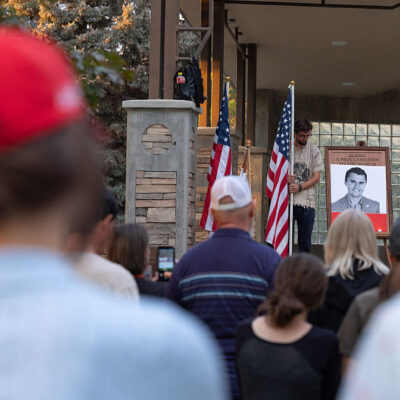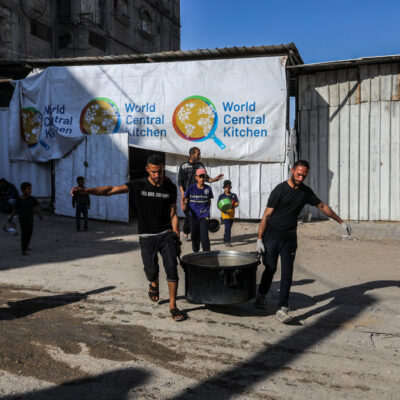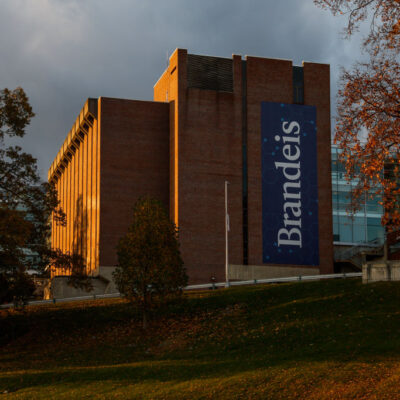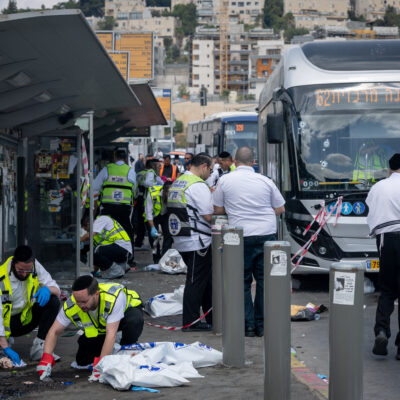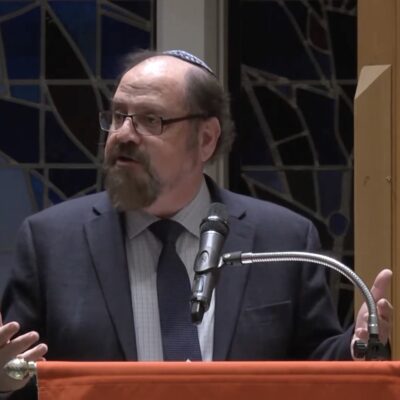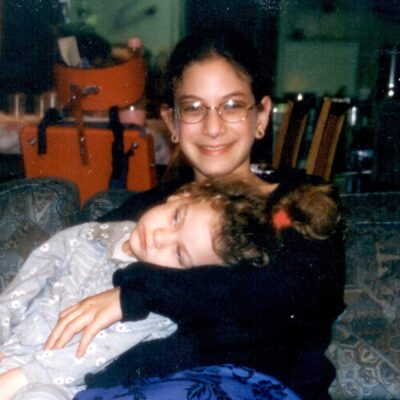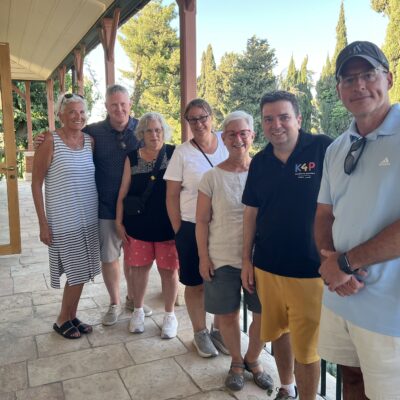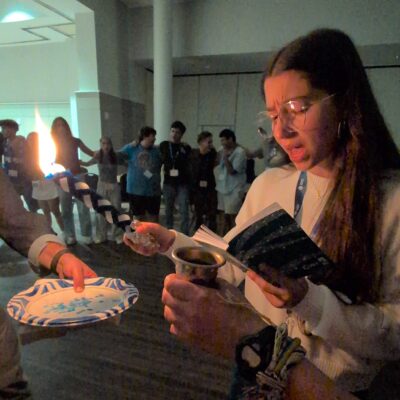Israel-Diaspora Relations
L.A. synagogue partners with Gaza border Kibbutz Ruhama to help it rehabilitate, create personal ties
Project leaders say the connection is mutually beneficial, offers new model for communities abroad and those in Israel to support each other

Courtesy/Kibbutz Ruhama
Shelby Lebovitz (blond girl on right) and Naomi McAbian from congregation Valley Beit Shalom in Los Angeles stand with children from Kibbutz Ruhama near the Gaza border, in an undated photograph.
A new partnership being developed between Kibbutz Ruhama in the Sha’ar HaNegev region of southern Israel and Valley Beth Shalom (VBS) synagogue, one of the largest Conservative congregations in Los Angeles, aims to redefine Israel-Diaspora community relationships by emphasizing a more personal and ongoing connection that involves all sectors of the communities, the project leaders say.
The California congregation initially committed $140,000 toward Kibbutz Ruhama’s building of a skate park and bike bump track for the first such teen park in the region, and also for the renovation of its community center and senior center following a visit to the kibbutz by a delegation of the Jewish Federation Los Angeles, which has also partnered with the project with a matching donation. Now the two communities are hoping to form a more personal connection between their members.
Located roughly eight miles from the Gaza border, Kibbutz Ruhama has until now been the only community in the hard-hit Sha’ar HaNegev region that was excluded from the government aid package for Western Negev communities. Despite experiencing the same fear and trauma as other communities in the area during the Oct. 7 Hamas attacks, it was left out for not meeting criteria, including not having had any missile strikes or suffering any casualties during Oct. 7.
So while KKL-JNF and the Tekuma directorate, which has been tasked by the government to rehabilitate areas affected by the war in southern and northern Israel, stepped in to build 120 units and infrastructure for the new neighborhood Kibbutz Ruhama opened to Kibbutz Kfar Aza, one of the hardest-hit communities during Oct. 7 with 64 members murdered and 19 taken hostages, Kibbutz Ruhama has had to raise funds to rehabilitate the community.
“We were super impressed by the kibbutz’s 98% vote in favor of bringing on all of Kibbutz Kfar Aza’s residents in what they, and we, see as a very Zionist statement at a time when Israel needed to come together and really help one another. We thought that was a very meaningful story,” said VBS member Rich Robin, committee chair of the newly created Israel Relationship Fund. The fund was originally established as the VBS Israel Emergency Fund to direct funds for emergency needs in Israel following Oct. 7. The VBS professional staff is now working on plans to inject programming to sustain that relationship, he said.
“We’re really trying to get to know the recipients of our work and we’re trying to build programming that will help us continue our relationship,” he said.
Prior to the government’s unanimous vote this week to approve a budget framework that would include Kibbutz Ruhama in reconstruction efforts, the mayor of the Sha’ar HaNegev region, Uri Epstein, sent a letter on April 20 to Knesset members calling the exclusion of Kibbutz Ruhama from the budget “a fundamental error.”
He noted that on Oct. 7 Ruhama residents were confined to safe rooms due to the presence of terrorists in the nearby area like other residents of the region and outlined how that day had impacted the kibbutz community, which included the self-evacuation of over 70% of Ruhama’s residents, a dramatic increase of over 1,000% in the number of people receiving treatment through the Resilience Center in 2023 and disruption to both its business and agricultural sectors due to the security situation.
“The decision to exclude Ruhama from the list of eligible communities is a fundamental error — professionally, economically, and socially,” Epstein wrote. “Every community, every family, every child experienced the same fear, the same anxiety, the same night that left deep scars both physically and emotionally.”
Kibbutz member Anat Hadar said the planned connection with VBS brings a certain surge of optimism to the kibbutz as its members strive to rehabilitate their community. “There is a desire to make contact at different age levels. That is with children as well: [twinning] of classrooms in the schools, also with the teens and young adults. We have a lot of ideas: experiencing holidays together virtually, kids sending drawings. It’s more of creating a community,” she said.
Though effectively underway, the project has not yet been formally presented for approval by kibbutz members, and VBS is planning to present the initiative to its congregation during its upcoming Yom Ha’atzmaut celebration. Plans are underway for the synagogue’s annual sixth grade day school trip to Israel to include a visit to the kibbutz, and to forge relationships between senior members of both communities as well, said VBS Senior Rabbi Rabbi Nolan Lebovitz.
“There can be a lot of different points of contact here between the two communities, and I think that the Jewish people will be better off [with this kind of contact]. This is in many ways a pilot project for other synagogues and other communities around the world to learn from, because I think that every community in the diaspora should have a community in Israel that they are invested in financially, emotionally and personally,” he said.
Recently, Hadar hosted two young members of the VBS community, including Lebovitz’s teenage daughter, who spent a week at the kibbutz volunteering with children in the school and after-school care.
“It was really, really successful,” Hadar said. “It is important to get to know another community and different lifestyles — people who are Jewish but don’t live in Israel. And I think it is important that they know what life is like here. What we are dealing with here, what are our challenges. The girls want to come back in the summer again, so it seems both sides benefited. They enjoyed volunteering and we also enjoyed the fact that we got to know them and they helped the children.”
Lebovitz said he hopes the visits will be mutual and just as VBS members will be welcomed at Kibbutz Ruhama, members of Ruhama would be welcomed by VBS members. “Our community has an incredible spirit, and we’re blessed to have special congregants who wanted to bring this idea to fruition,” said Lebovitz. “My goal has always been to build the most Zionist congregation in America, and I think that it goes without saying, to do so, you need Zionist congregants who believe and who hold Israel as an important value. I think this congregation will stand as a model in terms of how that kind of Zionist aspiration, that kind of spirit here in America, should be espoused.”
He also noted the role the Los Angeles federation has played in collaborating to support the connection and the initial donation.“Many synagogues try to act alone, and many federations, of course, act with the funds that they’ve collected… This lays the seed for perhaps the way that synagogues and federations can work together in this kind of new world order of philanthropy,” he said.
For years, the prevailing narrative suggested that Israeli and Diaspora Jews were growing apart and moving in separate directions, but Oct. 7 shattered that notion, he added. The response from American Jews proved the deep bond that still exists.
“It’s crucial that not only do we have personal relationships in Israel, but that Israelis have personal relationships in the diaspora as well. It’s as simple as this: we’re all the family that we have,” Lebovitz said. “We need to draw strength from Israel…and I think it’s very important that it’s reciprocal. Ruhama is going to give Valley Beth Shalom a specific place inside of the Land of Israel that we will feel like we are connected with at all times.”

 Add EJP on Google
Add EJP on Google